downunder underground
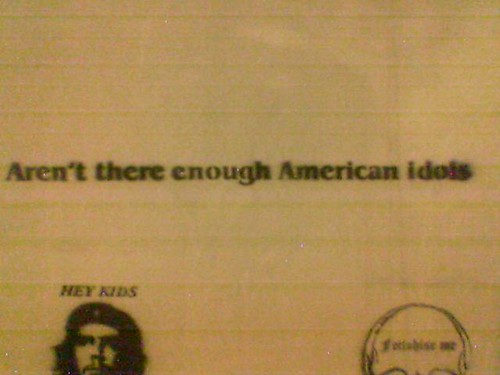
the outbreak of "race riots" in sydney should have come as anything but a surprising development, especially for expatriate lebanese-australians or, say, anyone who paid attention to the recent insurrection in paris. indeed, given the similarities between that flare-up and the still smoldering cities of france, i'm surprised that no one has yet fingered hip-hop.
seriously though, how do we reconcile sydney's seemingly serious social rifts with what appears to be, if perhaps a more marginal subculture than the "surf movement," a downright vibrant hip-hop scene? maybe it's elementary: hip-hop's embrace on the part of certain australians makes plenty of sense against the backdrop of a pervasively, and sometimes explicitly, racist society. and though i wouldn't want to generalize too strongly about who constitutes the "hip-hop community" in australia (as if any such monolith ever exists), i think that the recent riots do call our attention to one partial answer to bakari kitwana's underlying, provocative question, why do white kids love hip-hop? because other white kids don't.
now, though that might seem a naive recuperation of what otherwise might be understood as fascination, fetishization, and appropriation, i think that we would do well not to forget the fundamentally anti-racist gesture implicit in anyone's serious engagement with the forms of hip-hop. even on the quotidian level of challenging the sartorial--or sonic--norms of an otherwise invisible whiteness, by embracing hip-hop white-kids-who-love-hip-hop can often productively animate public discussions and cultural politics around race. in many cases, too, the anti-racist gesture becomes more than that: it becomes a position, a practice, an ontology. of course, the same gestures can also be less than that, ending up rather empty when they fail to translate into any sort of meaningful action or movement toward change or when they fall into the familiar pits of romanticization and, once again, a reification of racial categories. or as ian maxwell puts it:
There is, indeed, a sense in which African-American blackness figures (and, it has to be acknowledged, is promoted, and promotes itself) to these Australian teenagers as an exotic, somewhat sexualized other. (x)maxwell reminds us of the obvious in order to explain how hip-hop itself figures in australia's sense of itself as "cut through with ambivalences and anxieties about place and identity" (ibid.)--which is something of an abstract way of saying that australia is divided (and who's on what side again?) when it comes to making sense of a history of racist oppression, appropriation, and exploitation.
interestingly (for me anyway), australia is like many hip-hop scenes outside of the US in that its idea of hip-hop style often contains a heavy dose of reggae. one remarkable facet of this conflation between the two (which otherwise suggests interesting things about the ways that hip-hop and reggae travel outside of the US/caribbean) is the way that such styles themselves figure in artists' and audiences' negotiations of race and nation in such "glocal" contexts. (and though glocal is a terrible word and should be left to die in the obscurity of discarded neologisms, it does describe somewhat well the convergence of globally-circulating ideologies/forms and local contexts of reception and practice.) maxwell, for instance, discusses an artist who claims that his raggamuffin flow was "influenced by London ragga rap rather than North American rap, conceding the Afro-Caribbean 'roots' of that scene, but carefully distancing himself from charges of imitation or of subjection to a putative American cultural imperialism" (203). so we see how such overlapping (if not conflicting) identifications can become quite a tangle--binding and cutting even as they connect.
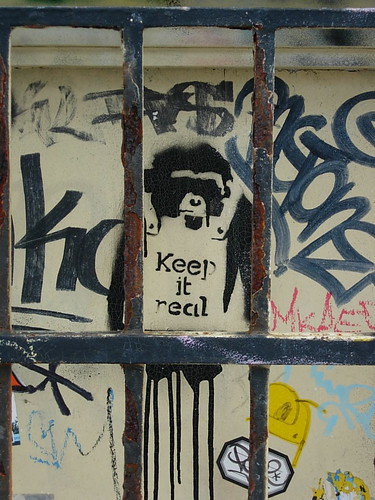
all of this is something of a preamble, though. a few weeks ago i got a buncha CDs from the sydney-based elefant traks stable. although i tried to approach the recordings with open ears, without fail the tracks would turn my thoughts to the state of australian hip-hop--and in particular how this batch of new recordings, though admittedly from one camp, reflects on the scene (and society) more generally, where it's been, and where it's going.
when i think of australian hip-hop in the abstract i think of a certain playfulness that comes with the distance of being on the other side of the world. for instance, one hears a generally ecumenical approach to sample sources (as exemplified by the avalanches, the turtablist collective who earned themselves no small distinction among the crowded field of well-endtroduced cut-chemists)--though one could see such an openness as simply consistent with an underground or "true school" ethos, which seems to mark much hip-hop outside the US. at the same time, though, austalian hip-hop also seems to be saddled by a degree of mimesis that suggests a struggle to find its own voice. this especially emerges in the rapping, where, perhaps in attempts to sound absolutely nothing at all like some crocodile dundees, too many MCs still resemble aussie stand-ins for stateside favorites. (if you like aesop rock, you'll love aussop rock!)
with regard to some recent releases from the elefant crew (who show no small promise as a professional, dedicated, and talented bunch), what stand out most for me are, perhaps unsurprisingly, the instrumentals, the beats-for-heads numbers. these aren't remarkable in their distinctiveness as an index of locality (i.e., their australianness), per se, but they certainly succeed on the same scale as their american and european counterparts. (which may or may not be the scale on which they should be weighed--i suppose i prefer several scales. it's a question of contexts and such.) don't get me wrong, ya herd? this is some well-crafted hip-hop--reverent, but not without a sense of play; inventive, if a bit conservative. it won't make the kiddies dance like fiddy does, i don't think, but it gives you plenty to listen to, especially, i imagine, if you're an australian youth looking to brandish a backpack like a badge of courage.
or, perhaps, a trenchant t-shirt?

at any rate, my favorite disc of the bunch is, without a doubt, pasobionic's empty beats for lonely rappers.
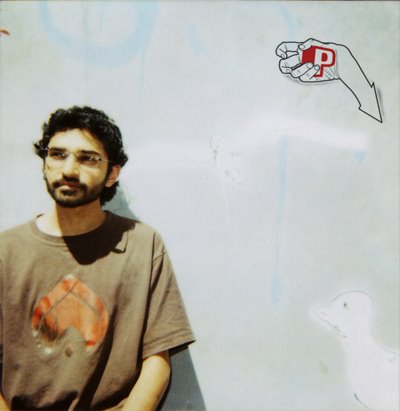
at times rather reminiscent of flack's blue beats mix, empty beats supplies the lonely rapper with no end of choice, chill, head-nodding beats. perfect for the living room or the lounge. (the kitchen, too.) fine for freestylin' or just plain stylin'.
pasobionic, "empty beat 2"
in a similar vein, unkle ho's roads to roma grabs odd sample sources from across the map and across various eras: klezmer, tango, mariachi, dixieland, mid90s dancehall, hawaiian slack-key, blues rock, you-name-it. at times, though, the parade of nations gets a bit tired. there's something a little too cartoonish in this soundgrab: such representations of ethnicity, although explicitly deconstructive in their kitchy connotations, can still serve to reify rather than subvert stereotypes.
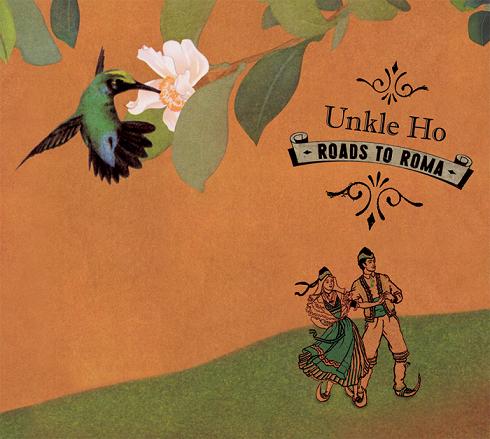
but then, who am i to say what's a "proper" tactic of (anti-anti-?)orientalism? i think unkle ho certainly deserves a say. his mix of eastern signifiers and swing-era jazz on the following track perhaps presents a more complex picture of an imaginary australian soundscape than my cautionary reaction might imply. i'll leave it to you.
unkle ho, "grace of the guru"
if nothing else, the burgeoning hip-hop scene down under offers something of an alternative vision of australian society. with its vital and playful creativity, its outernational orientation, its (inherited) alignment with the rights of the oppressed, and its essential opposition to status quo racism, australian hip-hop can serve as the sort of grassroots social movement that its practitioners, as with so many practitioners of hip-hop worldwide, dream it to be. if it is to do so, though, aussie artists would do well to express to their fellow australians (and to the wider world) what it is they've learned from hip-hop and thus learned about themselves and their mates and their society. don't tell us what we've/you've already heard from def jux and such. tell us what you've heard on the beach, on the streets, in your head. tell us something we don't know. tell us something we don't see when we finally see y'all on TV. let us hear what the voices of the new new south wales really sound like. i have a feeling we'll like what we hear.
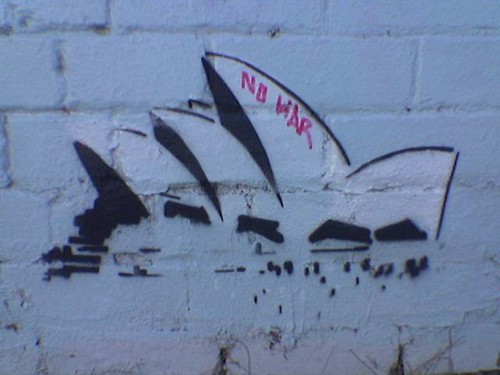



7 Comments:
Hey, good to see an article the Hip Hop of my land. But seriously, you need to put down the thesaurus, and use some terms doctors wouldn't use everyday. My vocabulary is fine enough I believe, though it's hard to stay focused when you're blathering on with things like "even on the quotidian level of challenging the sartorial--or sonic--norms of an otherwise invisible whiteness, by embracing hip-hop white-kids-who-love-hip-hop can often productively animate public discussions and cultural politics around race."
Most people would get lost in that. I had to read it about three times.
Nice coverage though, but check out www.obeserecords.com for an even wider selection of Aus Hip Hop.
Anyhow, I'm greatly proud of what my fellow countrymen are doing, Aus hip hop's being heard on the radio (I hear two or three tracks a day), the shows are huge (one group says it all: Hilltop Hoods), and it's getting noticed more and more worldwide. Like this article.
Well, keep up the good work, and use littler words. Some more Punctuation wouldn't go astray either. Sorry to be dragging you down over that... :P
thanks for the comment, and thanks for the link. more than that, thanks for reading certain sentences three times!
for the record, no thesaurus was consulted in the writing of this post. and i'm not sure too many doctors (unless you're talking ph.d.s) would use the same words i use, latinate suffixes notwithstanding. still, i see where you're coming from with your criticism.
frankly, i do my best to walk a careful line in this way, and--believe it or not--i like little words more than big ones. sometimes i just find that certain thoughts, depending on the complexity or the subtlety of the point i want to make, can only be said in certain terms. the main problem i seek to avoid, especially when talking about race, is to reaffirm some old and unproductive ways about talking about shit. that's that. but i'm always happy to give someone else an excuse to put it differently, to reword and remix.
peace.
Really interesting post Wayne. I too am Australian, though I'm on the other side of the country in Perth. I've got no problem with the vocab of the post, there's no reason why cultural criticism shouldn't have its own specialist language.
A few thoughts about hip-hop in Australia:
I think there's a lot of kids into hip-hop here who don't listen to Australian hip-hop artists.. maybe even the majority. The question of what those kids are doing with American hip-hop could be as interesting as what Australian hip-hop artists are doing.
Personally I think a lot of the white kids into American hip-hop here use it to articulate economic/classed marginalisation. Australia doesn't seem to have a way of talking about class conflict - we're profoundly invested in notions of egalitarianism from the Anzacs on - and hip-hop often seems a way for working-class kids to express that anger. So it's not surprising that Eminem is the MC of choice for a lot of white kids, maybe (probably?) as a way of avoiding race.
*Definitely* agree with the sense of exoticism of blackness. That's not just for white kids, though.. There often seems to be a kind of symbolic equivalence between blackness in America and blackness in Australia (for Aboriginals or Africans) or non-white-ness (that liminal racial status here of Indians, Lebanese etc, even Greeks and Italians), American hip-hop is *the* model to be imitated.
Australian hip-hop seemed to struggle for a long time, it was probably only when artists started rapping in their own accents that it started to gain some momentum--and I think we'll increasingly see artists dealing with issues of race and class in the wake of these riots.
I'm from the same side of the nation as you Scenius. I'm especially proud of such artists as Clandestien (I challenge anyone to find... darker hip hop than that), Downsyde, Layla, hell, the whole Syllabolix crew. For Western Australian-specific hip hop info, www.isolatedhiphop.com is good.
As for the race issue, well yeah, I was into Eminem for a while. But I discovered that my own people were making hip hop in their own accent, their own style, and talking about things I could understand and relate to. I've never gone back, and I don't really listen to a lot of US hip hop at all now. But I'm open to everything.
The Australian hip hop scene is quite racially diverse, with a lot of artists being of ethnicities other than caucasian. In regards to financial/social status, there's a great sarcastic track by 2Up called 'Why Do I Try So Hard?' which basically pulled the piss out of the wannabe 'homies' and 'gangtas'. With lyrics like "Yeah, like Ice Cube's hanging out in Parramatta" "only room for two with the woofers in the back, blasting your doof-doof crap and your gangsta rap" or something like that... it was a while ago... And a huge hit on the radio. I'll try to find that actually...
Each area of the country is putting out great hip hop. The Syllabolix crew in the west, Certified Wise and the rest in the south, and heaps in Melbourne, Sydney... all over the place. There's even a crew out of Darwin (can't remember what they were called) putting out very political hip hop (a lot of aus hip hop is very political - absolutely no 'bling n bitches' here mate... well, maybe Bliss n Eso :P). If it weren't for radio station Triple J (www.triplej.net.au), a lot of people wouldn't know Australian hip hop existed. In particular, Maya Jupiter's (a female MC in her own right) Hip Hop show, which has heaps of Aussie talent.
Over the past few months, there's been a few aus hip hop 'feature albums' on the station, including Pegz' Axis (which I got for Christmas. Pegz is an MC and owner of Obese Records, out of Melbourne) where they played pretty much half the album every day over the course of a week. Also, The Herd's The Sun Never Sets (which I also got for Christmas. You should know about them - they're on Elefantraks too. Consisting of artists like Urthboy, Ozi Battla, etc. from Sydney). This was a major hit on the station, not to mention their cover of the track 'I Was Only 19' which is one of the most requested songs at the moment.
Aus hip hop has struggled for a long time, and still is. But I believe it's at a great point right now, between being totally underground, and being mainstream and marketed to hell.
Even back in the late 80's though, there were crews like Defwish Cast (whom I think recently released something...) who rapped in their own accent, and paved the way for today's aussie MC's.
Well, I can also give you some more links if you'd like, but you may have seen many of these before.
www.ozhiphop.com - huge site and forums run by Mass MC.
www.therapcella.com - huge archive of hip hop the world over. Search by country to find a massive list of Aussie artists.
www.checkoutwax.com - Heaps of aus hip hop for sale, and one minute clips of pretty much every track to listen to
obeserecords.com and elefantraks.com which you know about obviously... There should also be links on all the sites listed as well, so be sure to check it out.
Anyway, hope that was of use to you ;)
thanks for the continued conversation, scenius and dane. (and thanks for all those links, too! it's great that people who read my unbalanced screed above will be able to get a broader perspective by browsing these sites.)
there's been some illuminating conversation over at fortune grey, too, especially the comments by seb from cyclicdefrost.
if anything, this all confirms my impression that hip-hop is really thriving in various australian locales--and engaging with issues of local interest, too.
i remain somewhat skeptical about aussie MCs' devotion to (explicitly) confronting race and racism at home, but i certainly can't claim to have heard everything and i can't claim that MCs anywhere else do so themselves (or do a better job, perhaps). this is tricky terrain indeed, but i've always been inspired by hip-hop's ability to encourage and inspire people to speak frankly about race/class issues, depsite all the mythmaking that goes on alongside.
Hi Wayne,
as an aussie reader of your blog and one who appreciates most of what you write it was interesting to stumble upon this post a little late.. good to see someone internationally recognise that aussie hip hop even exists! I must say I tend to agree with most of what seb says re context, in the right spots oz hip hop can be awesome, and in turn awful.
A few things I thought I should speak up on though, firstly, claiming that aussie kids are attracted to hip hop through some kind of romantic notion of "black" culture is I feel, misled simply because when a lot of us were growing up hip hop was the most interesting new and exciting music about, especially in the musically bland landscape over here for teenage kids at the turn of the 90's. I would like to think that I started listening to hip hop because it was bloody good music, not because of who made it (and would hope that I still apply the same criteria in my assessment today)
Secondly I would like to further to Seb's point about how locations/characters are universally known through their mythology in the US. I think this is largely a result of rappers in the states rhyming about stories and local experiences and the fact that this compounds itself into a mythology over a number of years, there's no real other way to explain how I know the names of 50% of the streets in South Central LA! I think also that aussie MC's tend to rhyme about issues and politics a lot more and theres less local context than you may be used to.
anyway, keep up the fine work...
cheers
oh, also if you want to hear aussie MC's explicitly confronting racism... check the Herd's 77%, an explicit attack if ever there was one... your take on the beat may be of interest though!
hey m,
thanks for the comments. and, yeah, obviously i'm speaking here with but a minimal degree of exposure to the scene (though i try to keep my ears open). i'm grateful that this post has led to a deeper understanding of aussie hip-hop, for myself and hopefully for others who stumble across it.
i definitely didn't mean to imply that a romantic fascination is the only point of entry for australian kids to get into hip-hop. obviously, it's more complex than that, and we wouldn't want to be so reductive. at the same time, i tend to think that race is at the heart of hip-hop's appeal, even if at more of a subconscious/ideological level. even when we might be tempted to think that hip-hop appeals on a "purely" sonic level (which i agree with--i mean, there's no denying phat beats and dope rhymes, or "bloody good music" as you put it), i still think it's worthwhile to think about how our very perception of musical style has been conditioned by racial(ist) ideologies. (yes, i think it runs that deep. see radano's _lying up a nation_.) but again, i wouldn't want to imply that it's all reducible to that: that would do a disservice to the music, not to mention all y'all aussie heads (not to mention non-african-american hip-hop heads everywhere).
Post a Comment
<< Home